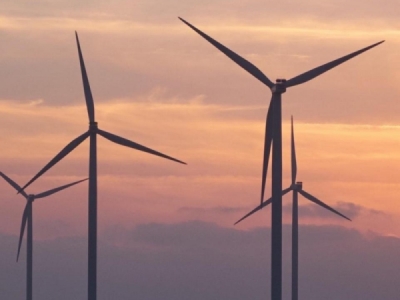
Posted on July 6, 2020
BOSTON – A federal-level effort that brings together technology and policy minds to coordinate regional supply chains, foster a skilled workforce and plan for reliable transmission would help offshore wind energy become an even more attractive source of power, three members of the state’s Congressional delegation said.
U.S. Reps. Joseph Kennedy III, William Keating and Katherine Clark on Wednesday are sending a letter to the U.S. Department of Energy (DOE) proposing that the agency establish a center of excellence to focus on supply chain challenges, infrastructure issues and transmission planning to maximize the benefits of the cleaner energy source in the United States.
The lawmakers point out that a law signed last year boosted funding for the DOE’s Wind Energy Technology Office and its offshore wind research and development programs, and that the law included language encouraging the department to begin researching infrastructure, transmission and logistics innovations to propel offshore wind forward.
“We believe a Center of Excellence on Offshore Wind Infrastructure, Supply Chain, and Transmission would build on this assessment to fill identified gaps and offer best practices in these areas. The Center would dramatically increase the efficiency and effectiveness of an offshore wind industry in the U.S. and help offshore wind energy become cost-competitive more rapidly,” Kennedy, Keating and Clark wrote in the letter. “As you know, Massachusetts is well-positioned to take advantage of this energy resource and improve the region’s energy security, and we encourage DOE to utilize the Commonwealth’s intellectual and research assets to help guide this assessment and Center of Excellence.”
Massachusetts is positioned to be served by the first commercial-scale offshore wind development in the United States, the roughly 800-megawatt Vineyard Wind I project, though a federal government review of the broader offshore wind industry has delayed that project.
In addition to Vineyard Wind, the Bay State has contracted with Mayflower Wind for a second roughly 800-MW offshore wind farm, fulfilling the mandate of a 2016 clean energy law to procure 1,600 MW of renewable offshore wind power. If both projects come to fruition as expected, state officials have said they would provide “approximately 12 percent of total Massachusetts annual energy demand.”
The Baker administration and utility companies are expected to seek the additional 1,600 MW of offshore wind energy generation in chunks of up to 800 megawatts, starting in 2022.
The members of Congress specifically suggested that a center of excellence could study ways to improve the design, fabrication, installation and monitoring of offshore wind support structures, work up plans for coordinated regional supply chains and maritime infrastructure, come up with updated logistical methods for transporting and installing “super-large components” over land and water, plan for a resilient offshore grid, assess the impacts of structures and transmission components to the coastal and ocean environment, and help to develop a highly-skilled manufacturing workforce for the offshore wind industry.
The Department of Energy already has centers of excellence for other slices of the greater energy world. The Hydrogen Storage Engineering Center of Excellence works to address engineering challenges posed by various storage technologies, the Metal Hydride Center of Excellence was established “to address scientific challenges to developing viable solid-state materials to store hydrogen onboard vehicles, leading to more reliable, economic hydrogen-fuel-cell vehicles,” and the Department of Energy’s National Nuclear Security Administration has at least four centers at universities working on nuclear stockpile science.
The U.S. representatives noted the offshore wind expertise that exists in Massachusetts, including at the Massachusetts Clean Energy Center and the Wind Technology Testing Center, and noted that Tufts University was the first to offer a graduate-level program in offshore wind infrastructure, that Bristol Community College offers technical programs, the Massachusetts Maritime Academy runs training programs, and the University of Massachusetts Dartmouth offers marine science studies related to wind development.
Source: southcoasttoday





